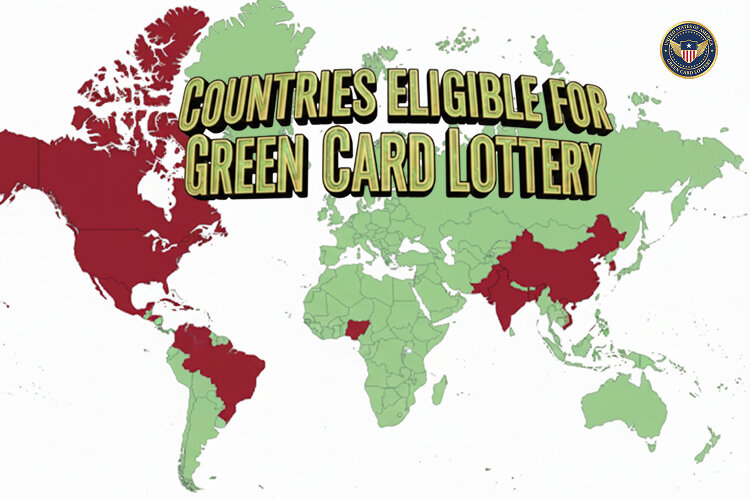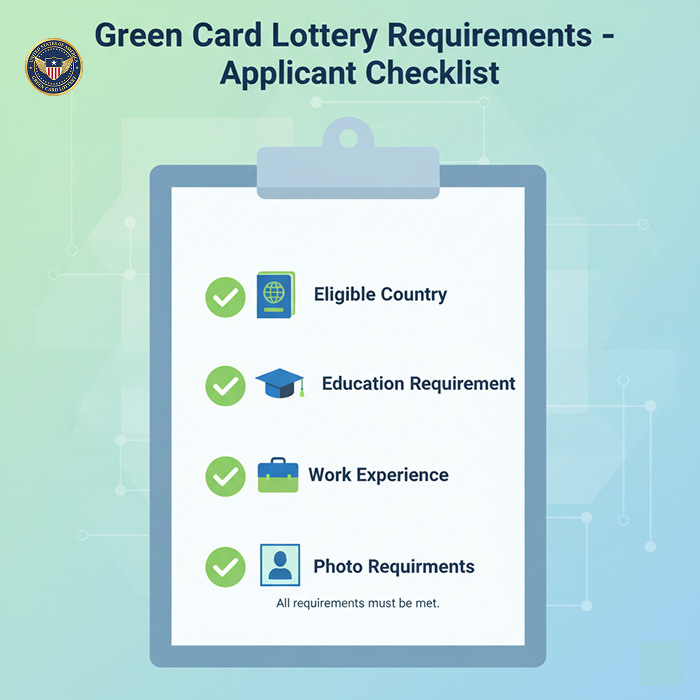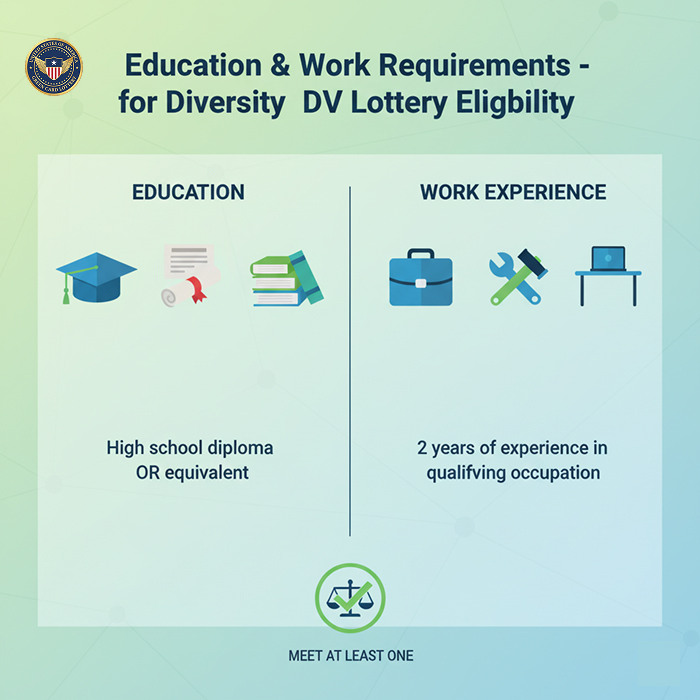Green Card Lottery Eligibility: Complete Guide for DV-2026–2027

Green Card Lottery Eligibility
Every year, the U.S. Diversity Visa Program, also known as the Green Card Lottery, offers 55,000 people from around the world the opportunity to live, work, and eventually become permanent residents of the United States. But before applying, you must first understand the green card lottery eligibility requirements.
These rules decide who can enter the lottery, what countries qualify, and what educational or professional criteria you need to meet. For DV-2027, the eligibility rules are based on updated immigration patterns and official guidance from the U.S. Department of State.
Table of Contents

What Is the Green Card Lottery?
The Green Card Lottery, officially known as the Diversity Visa (DV) Lottery, was established under the Immigration Act of 1990. Its purpose is to encourage diversity in U.S. immigration by offering opportunities to people from countries that have low immigration rates to the United States.
Each year, millions apply, but only a small portion are selected through a random computerized draw. Winning does not automatically guarantee a visa; it only makes you eligible to apply for one, provided you meet all the requirements.
To qualify for the Green Card Lottery, applicants must meet two main requirements:
1. Country of Birth (Chargeability)
Your eligibility is determined primarily by the country where you were born, not necessarily the country where you currently live or hold citizenship.
- If your country is on the list of countries eligible for the Green Card Lottery, you can apply.
- If your country is on the list of countries not eligible for the Green Card Lottery, you cannot apply directly.
Options if Your Country Is Not Eligible
You may still qualify if:
- Your spouse was born in an eligible country. In this case, you can claim your spouse’s country of birth, provided both of you are included in the application.
- Your parents were not born or legally resident in your country of birth at the time of your birth, and one of them was born in an eligible country.

This rule, known as cross-chargeability, is a standard method for applicants from ineligible countries to qualify for admission.
Core Green Card Lottery Eligibility Requirements
2. Education or Work Experience

If your country qualifies, you must also meet the education or work experience requirement:
- Education Requirement: You must have at least a high school education or equivalent, which means successful completion of a formal course of study comparable to a 12-year U.S. high school program.
- Work Experience Requirement: If you don’t meet the education requirement, you can qualify if you have at least two years of work experience in the past five years in an occupation that requires at least two years of training or experience. The U.S. Department of Labor O*Net Online database determines eligible occupations.
3. Other Key Rules
- Single Entry Rule: Each person is limited to submitting only one entry per year. Duplicate entries will lead to disqualification.
- Family Inclusion: You must include your spouse and all unmarried children under the age of 21 on your application, even if they don’t plan to immigrate.
- Correct Photo Submission: Photos must meet official standards (size, background, and quality). Incorrect or outdated photos are a top cause of disqualification.
- Admissibility: To be issued a visa, winning applicants must also pass criminal, security, and medical checks.

Countries Eligible for Green Card Lottery 2027
The most critical factor in determining your eligibility for the green card lottery is your country of birth. Each year, the U.S. Department of State reviews immigration data. It updates the list of eligible countries for the Diversity Visa (DV) Program.
For DV-2027, most countries around the world are eligible. However, some countries are excluded because more than 50,000 people from those nations have immigrated to the United States in the past five years through family or employment-based categories.
Countries Not Eligible for DV-2027
Natives of the following countries are not eligible for DV-2027:
- Bangladesh
- Brazil
- Canada
- China (including Hong Kong SAR)
- Colombia
- Cuba (newly added for DV-2027)
- Dominican Republic
- El Salvador
- Haiti
- Honduras
- India
- Jamaica
- Mexico
- Nigeria
- Pakistan
- Philippines
- South Korea
- Venezuela
- Vietnam
Note:
- Macau SAR and Taiwan remain eligible.
- Apart from Cuba (which is newly ineligible), the ineligibility list for DV-2027 remains the same as for DV-2025.
Eligible Countries by Region
Here’s a breakdown of DV-2027 eligible regions:
Africa
- Almost all African countries are eligible, except Nigeria.
- High participation countries include Ethiopia, Ghana, Kenya, Egypt, and Morocco.
Asia
- Most Asian countries are eligible, except for Bangladesh, China (mainland-born and Hong Kong), India, Pakistan, South Korea, the Philippines, and Vietnam.
- Eligible Asian countries include Nepal, Sri Lanka, Saudi Arabia, Jordan, and others.
Europe
- Nearly all European countries qualify.
- Notable eligible countries include Russia, Ukraine, Albania, Turkey, and Poland.
- The United Kingdom and its territories are eligible, except for Northern Ireland, which is subject to separate consideration.
North America
- Only the Bahamas is eligible.
- Canada, Mexico, and most Caribbean countries, such as Cuba, the Dominican Republic, Jamaica, and Haiti, are excluded.
South America, Central America, and the Caribbean
- Most countries are eligible, except for Brazil, Colombia, the Dominican Republic, El Salvador, Haiti, Honduras, Jamaica, Mexico, and Cuba.
Oceania
- All countries are eligible, including Australia, New Zealand, Fiji, Papua New Guinea, and Solomon Islands.
Why Are Some Countries Excluded?
The Diversity Visa program’s goal is to bring people from underrepresented countries to the U.S. If more than 50,000 immigrants from a country move to the U.S. in the previous five years (through family-based or work-based visas), that country becomes ineligible for the lottery.
This is why countries with large immigrant populations in the U.S., such as India, China, Mexico, and Nigeria, do not qualify.
Country of Eligibility: Key Rules
- Your country of birth is the primary factor, not your current nationality or residence.
- If you were born in an ineligible country, you may claim eligibility from:
- Your spouse’s country of birth (if eligible).
- Your parents’ country of birth (if neither parent was born or legally resident in your birth country).
This process is called cross-chargeability.
Example Cases
- Case 1: Born in India (Ineligible Country)
- You cannot apply directly. However, if your spouse was born in Nepal (an Eligible Country), you can apply using your spouse’s eligibility.
- Case 2: Born in Mexico (Ineligible Country), Parents from Spain (Eligible Country)
- You may apply under Spain as your country of eligibility.
- Case 3: Born in Nigeria (Ineligible Country), Married to someone from Ghana (Eligible Country)
- You can apply under Ghana if both you and your spouse are listed on the application.
Education Requirement for Green Card Lottery Eligibility
Meeting the education requirement is one of the most critical factors for green card lottery eligibility.
- Applicants must have at least a high school education or its equivalent.
- This means completing a 12-year course of primary and secondary education, comparable to a U.S. high school diploma.
- General Equivalency Diplomas (GEDs) do not count unless they meet official standards.
If your education was outside the U.S., it must be evaluated to ensure it matches U.S. standards.
Work Experience Requirement
If you do not meet the education requirement, you may qualify through work experience.
- You must have two years of work experience within the past five years in an occupation that requires at least two years of training or experience.
- The U.S. Department of Labor’s O*Net Online database is used to determine qualifying jobs.
- Examples of qualifying jobs include specific skilled trades, healthcare professions, IT roles, and managerial positions.
Unskilled work (like farm labor, housekeeping, or factory line jobs) does not meet the requirement.
Other Green Card Lottery Requirements
1. Valid Entry Submission
- Only one application is allowed per person. Multiple entries will automatically disqualify you.
2. Family Information
- You must list your spouse and all unmarried children under the age of 21 in your application.
- Leaving out a spouse or child may result in disqualification, even if you are selected.
3. Photo Requirements
- Photos must meet strict rules (size, format, background, no filters).
- Incorrect photos are a leading cause of disqualification.
4. Security & Admissibility
- Selection does not guarantee a visa. You must still pass criminal, medical, and security checks.
Common Reasons for Disqualification
Many applicants fail not because they don’t meet the green card lottery eligibility, but because of simple mistakes.
- Submitting multiple applications per year
- Incorrect or missing photos
- Not including a spouse or children
- Misstating the country of birth
- Lying about education or work experience
- Applying after the deadline
Green Card Lottery Eligibility Checklist
Before you apply, make sure you meet these qualifications for the Green Card Lottery:
- ✅ Born in a country eligible for DV-2027 (or qualify via spouse/parents)
- ✅ Have a high school diploma OR two years of skilled work experience
- ✅ Submit only one application per year
- ✅ Include spouse and children in your entry
- ✅ Upload correct, recent photos that meet official requirements
Conclusion
The green card lottery eligibility rules are designed to ensure fairness and diversity in U.S. immigration. For the DV-2027, most countries are eligible; however, high-immigration countries such as India, China, Mexico, and Nigeria are excluded. Applicants must also meet either the education requirement (a high school diploma or equivalent) or the work experience requirement.
Understanding these rules is the key to avoiding disqualification. By carefully reviewing the eligible countries list, education and work requirements, and common mistakes, you maximize your chances of submitting a successful entry.
The Diversity Visa Lottery remains one of the most unique opportunities to immigrate to the United States. If you qualify, applying is the first step toward making the American Dream a reality.


